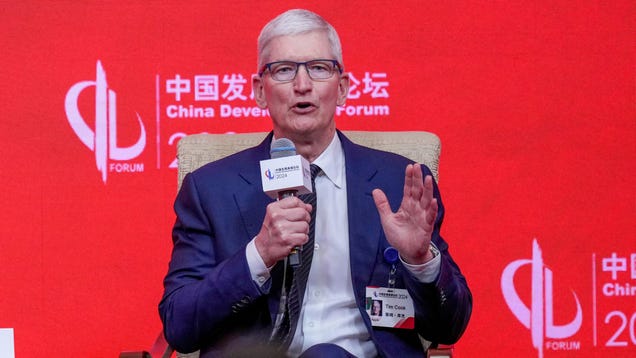
Poor, poor Apple. The world’s richest company (it slides up and down, but it’s always hovering near the top) wanted only to find an automaker to be its dancing partner for its autonomous, electric car project. It probably envisioned the likes of Hyundai and Nissan would fall over themselves for the mere opportunity to contribute all their latest technology and manufacturing expertise to a vehicle for which they’d receive no credit in the marketplace.
Well, what a surprise — it hasn’t happened. After Hyundai wrangled with (and leaked) a potential partnership, and then Nissan was rumored to have done the same, Apple’s met with a handful of carmakers with nothing to show for it. Now it has little choice but to turn to a contract manufacturer, like Magna Steyr or its familiar friends at Foxconn, according to a new Bloomberg report.
It always seemed like things were going to go this way. This game of Apple courting automakers has played out like some miserable season of the Bachelor where none of the contestants want to be there, yet still showed up anyway. Apparently Apple met with Ferrari during this exploratory phase, Bloomberg reports, which is tragically funny. There’s no details on what that discussion entailed, but whatever the topic was, “talks didn’t advance.”
Hyundai, Nissan and Ferrari are not impressionable startups primed to be commandeered — they’re multinational corporations that have been making cars longer than Apple’s been making computers. I’d argue a great deal of Apple’s success over the past two decades can be owed to its surprising lack of hubris. Sure, it talks big, but for the most part it stays in its lane, doesn’t introduce anything until it’s truly ready, and doesn’t get itself into weird corporate tie-ups and acquisitions that everyone can plainly see are doomed from the start. Thinking it could essentially subsume an established automotive brand as a contract manufacturer is uncharacteristic for Apple, but exactly the kind of hubris you’d expect from a company in its position.
Of course, making cars is hard and expensive, and I understand why Apple wanted to give this a shot. As Bloomberg rightly points out, it reflects how the company builds its gadgets. Tim Cook’s crew designs the product, and somebody else builds it.
G/O Media may get a commission
But there’s a difference between asking, say, Magna Steyr to make your car, and asking Hyundai. The latter has its own cars to sell, with its name on them. It’s probably not going to be quite as thrilled if the result ends up a booming success. A helpful analogy from Bloomberg:
A longtime manager at both Apple and Tesla Inc. said this would be like Apple asking bitter smartphone rival Samsung Electronics Co. to manufacture the iPhone. Apple wants to challenge the assumptions of how a car works — how the seats are made, how the body looks, the person said. A traditional automaker would be reluctant to help such a potentially disruptive competitor, said the person, who asked not to be identified discussing private matters.
Yes, Apple has a history of upending industries. It changed the way record labels distribute music, and the way people buy it (well, until Spotify showed up.) It changed the way software is distributed, too. But shifting paradigms of how people find and use content is quite a different beast from a top-to-bottom reinvention of how cars — probably the single most complex physical “good” we buy — are made.
It’s also much more difficult to make money out of the gate in this business. “Auto industry profit margins are lower than Apple’s current model,’” Bloomberg quotes Goldman Sachs analysts as saying in a recent investor note.
By opting for a partnership with a firm like Magna, Apple can avoid the inevitable conflict of egos that would likely unravel if it chose a consumer-facing factory partner. There’s still a part of me shocked that a company with as much experience selling things as Apple didn’t just save itself the time and admit this sooner.
Source: gizmodo.com








